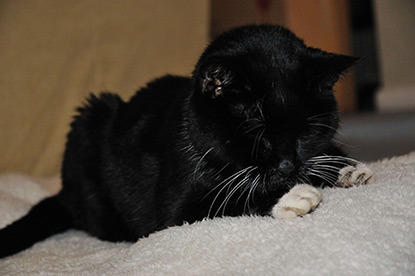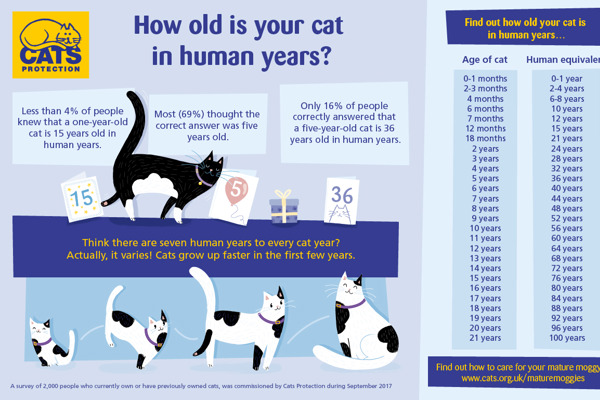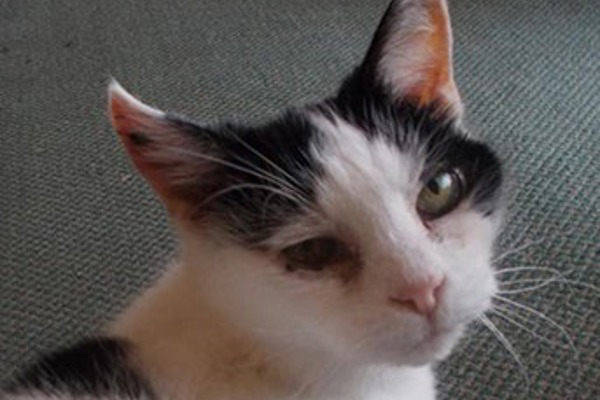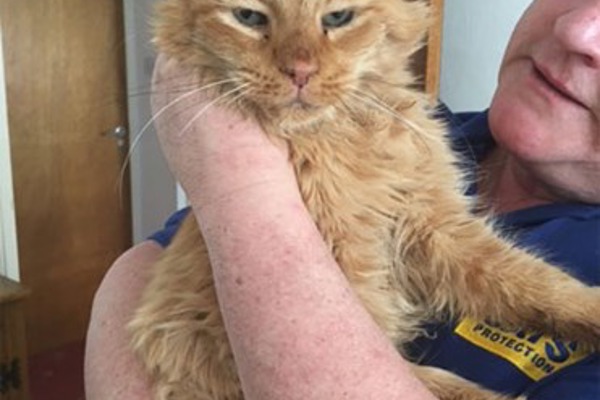A supporter pays tribute to his remarkable senior cat Jess, who has settled well into her new home and takes everything in her stride despite recently losing her eyesight.
This week we are celebrating golden oldies. During kitten season (April – September) older cats take six and a half times longer to be homed than kittens.
This post has been written by supporter and cat owner Phil Douglas.
Imagine you are a cat and that late in life you have the misfortune to develop chronic kidney disease that has raised your blood pressure to such a level that it has caused both retinas to detach. So you are now blind and you are homeless as your previous carer died. What is your future? How do you survive? If you are lucky enough, Cats Protection will find you a loving home. As a blind cat you adapt and live your life to the maximum possible. Life can still be good.

Gentle Jess
15-year-old Jess came to us from CP's Rayleigh, Castle Point & District Branch some six months ago, our first blind cat.
We had to do some serious decluttering of the home to make it as easy as possible for her to navigate with no sight. Then keep everything the same, don’t move furniture around and don’t leave your old boots lying around in the hall. Jess has the run of the downstairs floor, no stairs for her of course and occasionally, in the better weather, she goes outside into our secure garden where we can make sure she comes to no harm.
Jess initially had to ‘map’ our home. She would turn in circles until she met an object and kept doing so for many weeks until she had fully memorised the layout of her new ‘forever’ home. She is calm and adopts a measured and considered approach to walking around. She does not hurt herself and she knows the shortcuts behind the sofa, around the coffee table and even under it. She really loves to go ‘off-piste’ and she totally disappears sometimes, only to come out from under a loudspeaker stand or from behind the television with cobwebs on her head (we should clean more). She is intrepid. Nothing stops her from going where she wants to go, as with all cats of course. And that is the main thing – she is still an inquisitive cat and her disability will not deter her nor stop her from living her life to the full. She is an inspiration.
She finds the litter tray nine times out of 10 (a better hit rate than many of us men apparently) and knows where all her watering stops are, which she needs for her condition. She sometimes needs help with moving her food around the bowl and she has a tendency to silently creep up on us so we have to be extra careful where we put our feet! She just adores the vacuum cleaner, following it around and purring big time when she gets near the noise!
Jess has a fleecy blanket with two hot water bottles underneath to help keep her aches and pains at bay as she has some muscle wastage in her back legs and likely rheumatism. She loves the heat and spends her resting time on or between the bottles. Jess loves cuddles too and knows the exact location of where she is likely to be picked up (at my feet where I sit watching TV).
Jess is a very sweet, loving girl and she is Little Miss Cutie with her black coat with white socks and whiskers. She just needs the right care and attention, but nothing that many of the good people reading this could not provide for a cat with a similar condition. Daily medication can sometimes be a challenge, but some cats accept this more easily than others. It is fortunate that I am self-employed and work from home, so I am usually here to look after Jess. Blind cats really need someone around most of the time to give them comfort that they are not alone and to be there for them.
As we live near a busy road junction and despite having a high-walled back garden, a young, fit cat would undoubtedly scale the wall and we’d be worried about her safety near the road. That is one reason we don’t look to home a younger cat. An older cat would tend to stay indoors a fair amount and on the odd occasion it would go out, would probably be content to sit in the sunny back garden without going too far afield. That is our experience.
Another reason is that the older cat finds it very hard to get a new home, especially if they are black or black-and-white (an unpopular colour choice it seems) and may also have a disability or a medical condition. Not homing a cat because of its colour is ridiculous. The last three cats we had took nine months, 12 months and six months respectively to find a home (ours). That is a very long time for a cat to be in a cattery, bedroom or garden pen. We feel it is only right to give the older cat a chance.
So as long-term cat lovers and keepers we always adopt an older cat as we have found from our experience of homing a number of oldies over the years that they are the most rewarding of cats. They give you immediate unconditional love and companionship and come ready trained in the art of using a litter tray. They just want to be loved and cared for, with a cosy bed, food, water and unlimited cuddles. They usually fit in with your home life straight away.
So what is not to love about an older cat? They have a lifetime of experience, have done their wandering and just want a comfortable home for their remaining years.
Jess gives us so much love in return for us giving her a home. She is a most rewarding and gentle girl and we feel extremely lucky to have her.
This post has been written by a guest blogger. The views expressed in this post do not necessarily reflect the views of Cats Protection.



